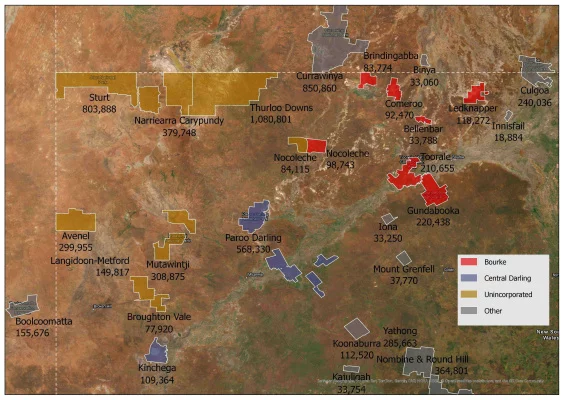
NO MORE NATIONAL PARKS IN WESTERN NSW

 Maxine K. signed
just now
Maxine K. signed
just now  Adam B. signed
just now
Adam B. signed
just now 
PETITION: NO MORE NATIONAL PARKS IN WESTERN NSW
This petition has been put together by community members of the Bourke district who are concerned about the rapid expansion of the National Parks estate in western NSW — and particularly the impact this is having on our region.
By signing this petition, you will be endorsing the recommendations below, aimed at addressing the major concerns surrounding the expansion and management of National Parks.
CONCERNS
In the last 20 years, the Bourke region has lost nearly half a million acres of agricultural land to make way for a suite of National Parks, Nature Reserves and State Conservation Areas — now totaling approximately 860,000 acres managed by the NSW Government. So, when the community learned the Government had recently acquired further properties in the district, and surrounding regions it was understandably not well received.
Across the Unincorporated, Central Darling, and Bourke districts, a staggering 4.67 million acres — around 10% of all land — has been removed from agricultural production. With no transparency, consultation, or compensatory policies and these communities have been left worse off.
Major concerns include inflated government purchase prices, which further limit opportunities for young people to enter farming. More significantly, the shift in land use has weakened the social fabric of regional communities and led to economic loss. Notable underfunding of parks management has allowed weed infestations, invasive feral pests, and unsustainable grazing pressure to increase. Meanwhile, prospective buyers are forced to compete in the market against their own taxpayer dollars, and local producers must manage the growing impacts of poorly maintained neighbouring parkland.
What’s happening in the western NSW park system feels all too familiar. It echoes the poor outcomes of water buybacks, live export bans, and the current renewable rollout — once again asking regional communities, through our 'democratic' system, to sacrifice their viability for the appearance of progress to voters who don’t have to live with the consequences.
A BALANCED APPROACH
We acknowledge that National Parks can play a role in preserving cultural heritage, assisting environmental conservation and in supporting the 'pastoral' regions tourism industry. These are worthwhile goals. However, without proper consultation, management and planning, these goals are at odds to the betterment of the community health as a hole.
RECOMMENDATIONS
- Halt further acquisitions: Cease new park purchases of pastoral grazing land, except in cases with clear cultural value. With so many underutilised parks already, adding more offers little benefit to tourism and only stretches the already limited management resources.
- Evidence-based acquisitions: Require rigorous scientific and cost-benefit assessments before any new park purchases, with decisions justified and measurable. Include diverse local representation in the process.
- Reallocate funding to park management: Redirect acquisition budgets toward effective on-ground management, transparency, and reporting of existing parks.
- Equitable landholder financial contributions: Require National Parks to contribute like other landholders by introducing payments for Western Lands Lease rents, Border Fence Management Board rates, Local Land Services rates, and Council rates.
- Higher oversight standards: Commission peer-reviewed, independent studies to assess the environmental, economic, and social impact of existing parks — including land degradation under public management — to improve outcomes going forward.
- Transparent reporting: Require annual public reporting on ecological condition, funding, visitor numbers, and economic contribution — with standardised benchmarks.
- Parks rationalisation: Identify park areas with lower cultural, natural, or tourism value. Lease or sell these areas for primary production under practical environmental covenants, and reinvest proceeds into sustainable park management and public reporting.
The agricultural industry is continuously held to account through Government regulation and public scrutiny — but who holds the Government to account for its greenwashing, poor land management and degradation of communities? There must be equal accountability.
By rethinking the current approach, we can strike a better balance — one that supports and builds up regional communities, preserves cultural heritage and improves environmental conservation, delivering a more sustainable and equitable western NSW.
We thank you for your support.
Comment
See More 0